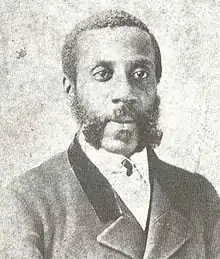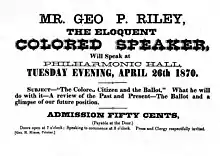George Riley (abolitionist)
George Putnam Riley (March 29, 1833 in Boston – October 1, 1905) was an African-American abolitionist in the United States. He was referred to as the "Fred Douglass of Oregon" by the Oregonian newspaper.[1]

Life and career
George Putnam Riley (Geo P. Riley) was a native of Boston born on March 29, 1833.[2] His grandfather was a participant in the Revolutionary War. Riley's father was engaged in the clothing trade in Boston. His parents, William and Elizabeth Riley, were abolitionists.[3][2] When Riley was a baby, his six-year-old half-brother James Jackson Jr. died.[2]
Riley was prevented from attending college because he was black. He worked at Benjamin Butler's law office, and later as a barber.[2] George moved to San Francisco in the historic California Gold Rush,[4] and later moved back to Boston. Harriet Elizabeth Gordon and he wed on April 30, 1866 in Chelsea, Massachusetts. They had a daughter in 1867.[2]
Riley moved to Oregon by early 1869.[2] In Portland, he was employed by the federal customs department.[4] He also briefly worked as a barber again.[2]
In 1869, Riley and twelve other Black men and two white men, organized the Workingmen's Joint Stock Association (WJSA) in Portland, Oregon.[5] Riley was president of the WJSA. They bought property in Seattle (20 acres) and Tacoma on speculation.[5] The land was under litigation at the time of his death, where it had been under litigation for more than 20 years.[6]
In 1887 he moved to Tacoma, Washington.[4] There, he orated Tacoma's Annual Emancipation Day festivities, and worked to resolve legal disputes relating to the properties belonging to WJSA in Tacoma.[2]
Harriet Riley died in 1896,[2] and Riley died on October 1, 1905.[2] Congressman F.W. Cushman attended his funeral and spoke about the lessons learned from Riley's life.[7]
Politics
Riley was a Republican, described as, "the ablest orator among the Republicans of Multnomah County."[8] He was a candidate for legislature, but did not win. In a "card" published in an Oregon newspaper Riley writes:
Portland, May 14, 1878 Editor Standard: -Noticing an article in your paper requesting me to reply to a question as to why I was not indorsed [sic] by the Republican Convention, or rather a clique who assume to be dictators of the party, I have only to remark that while they admit I have the ability, they discarded me on account of color. - Geo. Putnam Riley.[8]
Legacy
Riley had one daughter, Bonita Riley Wright.[9] She was a founding member of the Seattle NAACP in 1913.[10]
In 2004, a housing and commercial development group in Seattle was named in honor of George Riley Putnam. The company has taken its roots since 1983 as a result of the activities of African American businessmen followers of Riley.[11]
Speeches

- 1870, April 7, "The Ratification Jubilee", Portland, Oregon[12]
- 1870, April 26, "The Colored Citizen and the Ballot", Portland, Oregon[13]
- 1871, February 7, "Toussaint L'Ouverture, the Hero of San Domingo", Salem, Oregon[14]
References
- "Grant and Wilson". The Oregonian (Morning Oregonian). November 5, 1872. p. 3.
- Ward, Jean M. (2022). "George Putnam Riley (1833–1905)". Oregon Encyclopedia. Retrieved February 25, 2022.
- "Riley, George Putnam (1833-1905) | The Black Past: Remembered and Reclaimed". blackpast.org. 2007-01-19. Retrieved 2018-12-07.
- "PIONEER COLORED MAN PASSES AWAY" (PDF). Tacoma Daily Ledger. October 5, 1905. Retrieved February 20, 2021.
- "Attack on Title". The Oregonian (Morning Oregonian). October 9, 1904. p. 6.
- "George P. Riley Dead". The Seattle Republican. Vol. 12. October 6, 1905.
- "Funeral of George P. Riley" (PDF). Tacoma Daily Ledger. October 4, 1905. Retrieved February 21, 2021.
- Riley, George Putnam (May 17, 1878). "Card". The state rights democrat.
- "George Augustus Wright, Seattle, ca. 1914". digitalcollections.lib.washington.edu. Retrieved 2021-02-21.
- "1913-1948". Seattle King County NAACP. Retrieved 2021-02-21.
- Cohen, Aubrey; Reporter, P.-I. (2007-12-28). "Housing group continues mission of pioneering black developer". seattlepi.com. Retrieved 2018-12-07.
- "The Ratification Jubilee". The Oregonian (Morning Oregonian). April 7, 1870. p. 3.
- "Broadside: Lecture by Mr. George P. Riley". www.oregonhistoryproject.org. Retrieved 2021-02-02.
- "Morning Oregonian". The Oregonian (Morning Oregonian). February 6, 1871. p. 2.